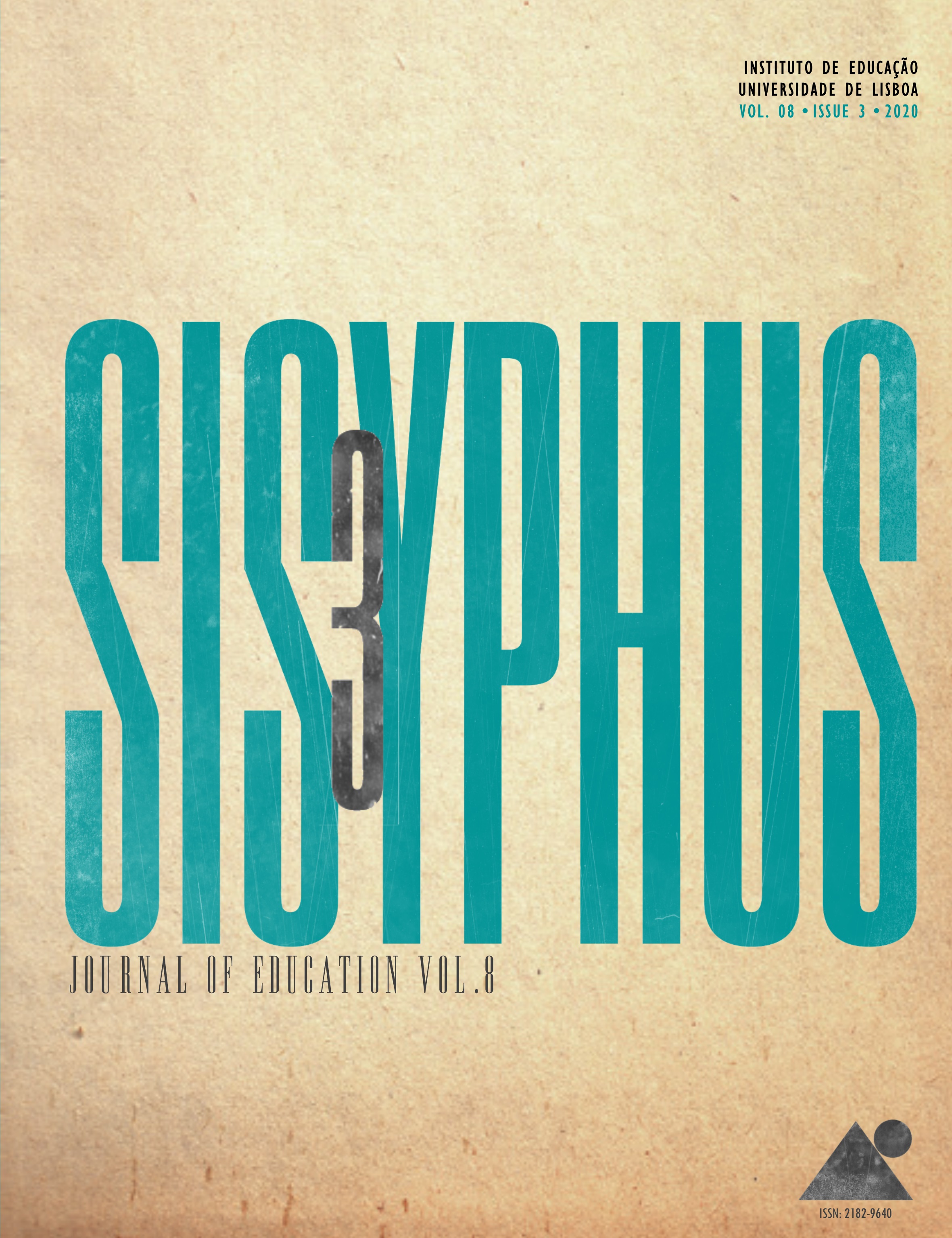Solidariedade Ecológica e Educação Popular
DOI:
https://doi.org/10.25749/sis.19952Palavras-chave:
ecofeminismo, humanização, emancipação, solidariedadeResumo
Este texto assenta no princípio que devemos ouvir a natureza e reconhecer a interconexão de todos os seres vivos. Destaco três princípios centrais da posição Freiriana sobre educação popular: intencionalidade política e preconceitos do educador; o diálogo como um processo epistemológico e ontológico; e a “vocação” da humanização. Partindo de uma lente ecofeminista, sugiro que solidariedade ecológica – ser uma parte de, em vez de apartada da natureza – deve ser tomada como fator essencial para qualquer educação no/do futuro. Isto faz com que se afaste a noção de emancipação de qualquer ideia de liberdade individual ou pessoal, e a alie a práticas de interdependência e de inter-relações como as inscritas no siginificado original da palavra “ubuntu”.
Downloads
Referências
ABULHAWA, S. (2017). Before the last river. In V. PRASHAD (Ed.), Will the flower slip through the asphalt. Writers respond to Capitalist Climate Change (pp. 100-111). New Delhi: New Left Words.
BURT, J., & LUSIKI, T. (2017). Being the Earth’s Comrade: Research for the People, by the People. In A. VON KOTZE & S. WALTERS (Eds.), Forging Solidarity: Popular Education at Work (pp. 105-117). Rotterdam: SENSE Publishers.
BUTTERWORTH, S., & WALTERS, S. (2017). Moves to decolonise solidarity through feminist popular education. In A. VON KOTZE & S. WALTERS (Eds.), Forging Solidarity: Popular Education at Work (pp. 27-39). Rotterdam: SENSE Publishers.
CESAIRE, A. (1972 [1955]). Discourse on colonialism. This version published by Monthly Review Press: New York and London, 1972. Originally published as Discours sur le colonialisme by Editions Presence Africaine, 1955.
COPAC – CO-OPERATIVE AND POLICY ALTERNATIVE CENTRE. (2019). Climate Justice Charter. Personal communication 10 January 2020.
DAVIS, M. (2020). In a plague year. Retrieved from: https://jacobinmag.com/2020/03/mike-davis-coronavirus-outbreak-capitalism-left-international-solidarity
FANON, F. (1970). Black skin, White masks. Frogmore & St Albans: Paladin.
FREIRE, P. (1972). Pedagogy of the Oppressed. Harmondsworth: Penguin.
FREIRE, P. (2000). Pedagogy of Indignation. Oxon: Routledge.
FREIRE, P., & MACEDO, D. (1995). A Dialogue: Culture, Language and Race. Harvard Educational Review, 65(3, Fall), 377-402.
FREIRE, P., & SHOR, I. (1987). A pedagogy for liberation. Dialogues on transforming education. New York: Bergen & Garvey.
GAZTAMBIDE-FERNANDEZ, R. A. (2012). Decolonization and the pedagogy of solidarity. Decolonization: Indigeneity, Education, & Society, 1(1), 41-67.
GIROUX, H. A. (2010, November 23). Lessons to be learned from Paulo Freire as education is being taken over by the mega rich. Truthout. Retrieved from: https://truthout.org/articles/lessons-to-be-learned-from-paulo-freire-as-education-is-being-taken-over-by-the-mega-rich/
GOSH, A. (2016). The Great Derangement. Climate Change and the Unthinkable. Gurgaon: Penguin Books.
GORZ, A. (1999). Reclaiming work. Beyond the wage-based Society. Cambridge: Polity Press.
GRIEVES, G., & CLARK, M. (2015). Decolonising solidarity. Overland. Retrieved from: https://overland.org.au/2015/09/decolonising-solidarity.
HOOKS, b. (2003). Teaching community. A pedagogy of hope. New York & London Routledge.
HORTON, M., & FREIRE, P. (1990). We make the road by walking. Conversations on education and social change. Philadelphia: Temple University Press.
KAHN, R. (2003). Paulo Freire and eco-justice: Updating Pedagogy of the Oppressed for the age of ecological calamity. Retrieved from: https://www.researchgate.net/publication/240595300_Paulo_Freire_and_eco-justice_Updating_Pedagogy_of_the_Oppressed_for_the_age_of_ecological_calamity
KLEIN, N. (2017). Let them drown. The violence of othering in a warming world. In V. PRASHAD (Ed.), Will the flower slip through the asphalt. Writers respond to Capitalist Climate Change (pp. 29-50). New Delhi: New Left Words.
KROG, A. (2020). FW de Klerk never had any moral intention, and he left us behind as white kansvatters. Retrieved from: https://m.news24.com/Analysis/antjie-krog-fw-de-klerk-never-had-any-moral-intention-and-he-left-us-behind-as-kansvatters-20200220?fbclid=IwAR3yBzlmGW1fVrH41fpb5aVk22aEVsHJCFpP0UfbmrymrNSAXz_1xD6yALs
MBEMBE, A. (2015). Decolonising knowledge and the question of the archive. Retrieved from:https://wiser.wits.ac.za/system/files/Achille%20Mbembe%20-%20Decolonizing%20Knowledge%20and%20the%20Question%20of%20the%20Archive.pdf
MELWA, K. (2019, September 30). Sleepwalking our way to extinction: the climate crisis must be made part of our national conversations. Daily Maverick. Retrieved from: https://www.dailymaverick.co.za/opinionista/2019-09-30-sleepwalking-our-way-to-extinction-the-climate-crisis-must-be-made-part-of-our-national-conversation/
MIES, M., & SHIVA, V. (2014). Ecofeminism. London & New York: Zed Books.
SALLEH, A. (2017). Ecofeminism as politics. Nature, Marx and the Postmodern. London: Zed Books.
THOMPSON, J. (2000). Emancipatory Learning. NIACE Library and Information Service. Retrieved from: http://www.aughty.org/pdf/emancipatory_learning.pdf
VON KOTZE, A. (1987). Theatre against Apartheid. New Left Review, May/June, 83-93.
VON KOTZE, A. (1988). Organise and Act. History of the Natal Workers Theatre Movement 1983-87. Durban: Culture and Working Life Publications.
VON KOTZE, A. (2020). Plays as education – producing useful knowledge for/with precarious workers. In L. COOPER & S. HAMILTON (Eds.), Renewing Workers’ education (pp. 161-180). Johannesburg: HSRC Press.
Downloads
Publicado
Edição
Secção
Licença
O Copyright (c) pertence à Sisyphus – Journal of Education. No entanto, encorajamos que os artigos publicados na revista sejam publicados noutros lugares, desde que seja solicitada a autorização da Sisyphus e os autores integrem a nossa citação de fonte original e um link para o nosso site.
Política de auto-arquivo
É permitido aos autores o auto-arquivo da versão final publicada dos seus artigos em repositórios institucionais, temáticos ou páginas web pessoais e institucionais.
Subscritor DORA
O Instituto de Educação da Universidade de Lisboa, editor da Sisyphus, é um dos subscritores da Declaração de São Francisco sobre Avaliação da Investigação (DORA).





